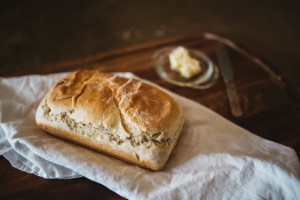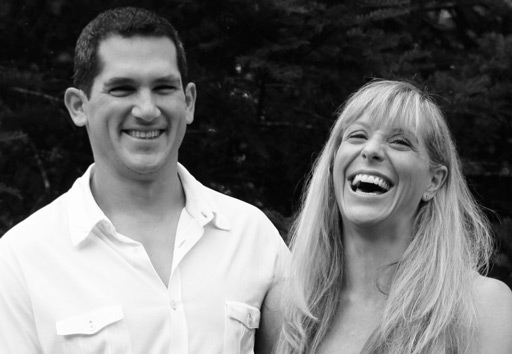I actually never thought I would be eating gluten again. At least, not if I didn’t want to feel bad. Recently, I had a light bulb idea! 💡 A few days ago, I was watching a very interesting documentary on Netflix called “Cooked” by Michael Pollan, best-selling author of The Omnivores Dilemma.
Yes, I know last week I wrote about TV sapping your energy but if you read the whole article I admitted to watching it sometimes and mentioned Netflix as a good way to control your consumption.
Anyways, back to Michael Pollan and eating gluten again.
Firstly, Pollan is excellent to read and maybe better to watch. He is a clear thinker, a great communicator and certainly goes deep in his research. He combines science and art with history and anthropology to examine food in ways that are rich and compelling.
“Cooked” is broken into four episodes: Fire, Water, Air, Earth. You should check out the whole series even if you only like food and a great story. The episode I watched that has inspired me to try eating gluten again was Air.
It doesn’t come lightly. I’ve been gluten-free for almost 3-years. Just for some context, before that, I use to be known for making the most intricate, massive sandwiches this side of Sandwich, Massachusetts.
The change in my health since getting off gluten has been dramatic. Some things I noticed:
- skin blemishes cleared up that had been there for years
- bloating and fatigue after eating disappeared
- lost stubborn belly fat
- better digestion as indicated in the bathroom and through lab tests with micronutrient deficiency corrections
- better moods
I know what you’re thinking, “it was all in my head”. Well, if you think it was psychosomatic, read my article Figure Out Your Food Intolerances. Besides, Bree also went off gluten which played a big part in putting her Rheumatoid arthritis into remission and getting off the toxic meds that are the gold standard for RA treatment.
The proof was in the pudding. With gluten gone, we feel way better, look better and have more energy. Also, as two parents with autoimmune diseases, it’s important to consider the increased likelihood of our children getting an autoimmune disease and try to prevent that.
I say this because the field of epigenetics is exploding with research that shows we can turn on and off our genes, i.e., alter gene expression, by how we interact with our environment. That means our genes do NOT necessitate the outcome but instead we have control to alter our fates. What you eat is potentially one of the most powerful epigenetic factors in changing gene expression.
Immense works have already been written on this and much more will come so I will go no further with epigenetics now other than to say, gluten has been highlighted as a trigger for autoimmune disease.
It can be debated that it is correlation and not causation but when you keep finding your garbage bin knocked over and food lying outside and your neighborhood raccoons keep getting fatter, you have a pretty good idea what’s up. Well, gluten has been leaving paw prints all around people’s ailments for years now.
This means that if gluten is a trigger for autoimmune disease (there are other factors at play as well), why would I feed it to my children who already are more susceptible? Well, I shouldn’t.
Okay, I went on a tirade against gluten and I told you I’d explain why I’ll try eating gluten again. Sorry. Old habits, you know. Check out a The Gluten Summit or Grain Brain, if you want to know more.
So let’s get to it…
Why I’ll Try Eating Gluten Again
By watching Pollan’s “Cooked” I learned something I already knew about lots of modern practices. As he says, “As a species, we are often too smart for our own good”. This is the case with many advances because we often rush forward without acknowledging the value of why things were done for so long.
Listen, there’s nothing wrong with trying new things but when it goes sideways, it’s wise to back up and look closer at what was working.
With bread, this hasn’t been the case. It was clear in “Cooked” that bread making has a long and intricate tradition and that only recently has it gone sideways. It was also clear that bread has great value to civilization both as a product of it and as an enabler.
Wheat is the largest crop on Earth and there is a complex worldwide economy revolving around it. Leaders need to keep the price of bread down to avoid civil unrest. In fact, the French Revolution and the Arab Spring were both tied to the price of bread and availability.

Bread is usually more affordable than vegetables or meat.
However, bread is not natural. “Bread and wheat couldn’t be more different”.
Wheat and other grains are not easily digestible for humans. The process of preparing them is key to both making them digestible and actually getting the nutrients out of them. When capitalism rushes to make bread cheaper, it overlooks why it was done traditionally in a painstaking way.
White flour is really cheap and is non-perishable. Result = persistent consumption leads to sickness.
Whole grain might be better but still the process doesn’t allow the product to be any more digestible.
Solution…
Enter Richard Bourdon of Berkshire Mountain Bakery, who has made bread with the care of an obsessed mad scientist.
The only way I can see myself eating gluten again…
You see it might not be gluten that’s the problem. Ruling out the ills of glyphosate infestation into crops or GMO wheat as being the sole cause of wheat consumption distress, it all comes down to the process.
Bourdon points out that dogs bury their meat, not to hide it, but to ferment it. Birds sprout their seeds. Both do so to make it more digestible.
He elegantly and simply states:
Nature instinctively knows what to do and we are a part of nature - Richard Bourdon Click To Tweet
So, he proceeds accordingly. Small scale, painstakingly, using alchemy to ferment his grains. This is a long and arduous task of making true sourdough using fermentation. It’s a delicate process. This can’t be achieved in large-scale production.
He clearly states,
grains are indigestible and ALL grains need to be fermented”. It’s difficult. It has to be done with natural starters and if you don’t do it, you don’t get the nutrients which are locked into the grain like Batman in the Batmobile.
The FDA used to have a strict definition of what bread was. It could have only 3 ingredients. Industry successfully lobbied to get that dramatically loosened. What we often eat today and call bread, is really not.
Bottomline:
Gluten in bread that is prepared the modern way with between 31-37 ingredients and not fermented is not nutritious and is causing health issues for many people.
Gluten contained in bread properly and carefully crafted using Bourdon’s principles of fermented sourdough (not the type of bread but the preparation style) could very well eliminate the issue of gluten intolerance for people who are NOT Celiac or have allergies to the ingredients.
I don’t know if it is okay for people who are suffering from other medical issues but the insights in “Cooked” offer another perspective of the problem and perhaps, it’s solution.
Everyone should be able to choose what they want to eat. Hopefully, industry and government value our health more than their profits but that often doesn’t seem to be the case.
Get informed.
Keep learning.
Know thyself.
Personally, after learning more about this:
I'm off to get the biggest gluten-filled croissant I can find... April Fool's! Click To TweetHonestly, we might try to make bread Bourdon’s way or maybe visit his bakery one day but until that day comes I won’t be eating gluten again.
It’s working for us that way, so why should we change it.
Yes, doing it Bourdon’s way will take a long time to prepare and no, it’s not convenient. But convenience doesn’t always solve problems, it often creates them.
Consider this:
- The average American spends just 27 minutes a day preparing food which is half the amount of time that was spent cooking in 1965.
- Commercially processed foods have a short history. Many were created during World War II to feed troops overseas. Post-war, food companies saw an opportunity increase profitability by getting those foods into homes, bringing on the TV dinner era.
- Marketing proceeded to push the value of convenience and degrade time in the kitchen until home cooking, family meals, and traditional food preparation became rarer than eating out, store bought meals and processed food.
The result: A population more obese, sicker, and less connected to nature and tradition than ever before.
There are lots of great things happening in the world and technological advances can make life better but balancing that out with ancestral wisdom and nature’s clues will greatly improve our way forward.
When I think about food, I like to think about what will give me sustained energy.
I choose what is the most nutritious, not the most convenient. #ChooseWithEnergyInMind Click To Tweet
[interaction id=”56fe02ee82287b5830c7d76d”]
Further references
Epigenetics and disease prevention
